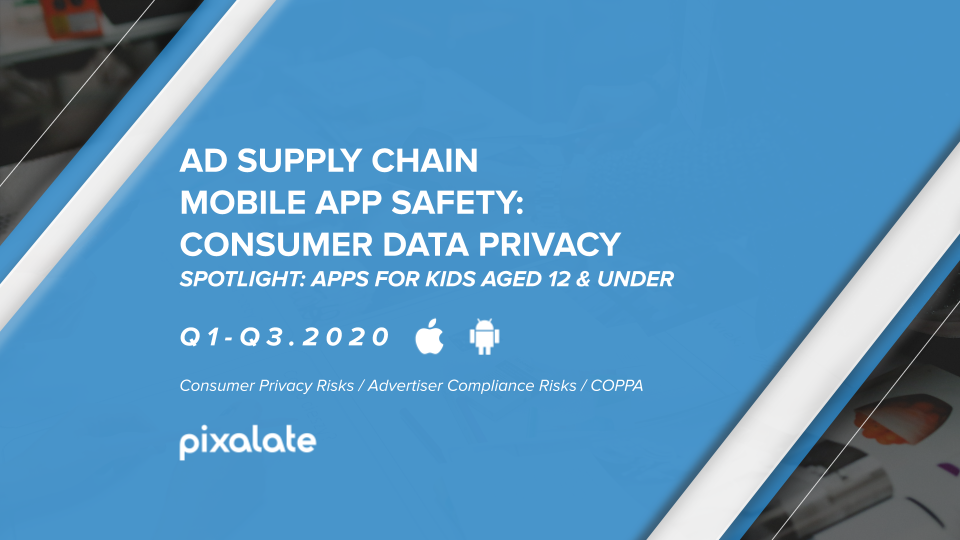
There are now over 5 million apps across the official Google and Apple mobile app stores; 90% of the apps are for kids (ages 12 & under), highlighting risk factors around consumer privacy & advertiser COPPA compliance
PALO ALTO, Calif., December 14, 2020 -- Pixalate, a global ad fraud intelligence and marketing compliance platform, today released the Q3 2020 Mobile Ad Supply: App Safety Report, which examines consumer privacy and advertiser compliance across apps from the Google and Apple app stores.
The Report focuses on apps for kids aged 12 and under (based on content or age ratings as provided by Google and Apple), which must comply with the Children's Online Privacy Protection Act (“COPPA”). COPPA also extends to advertisers that have “actual knowledge” that they are collecting personal information online from children in the U.S. under 13 years of age.
Pixalate’s research team found that over 4.6 million of the 5.1 million apps (90%) across Google and Apple’s app stores are for kids aged 12 and under and analyzed trends relating to consumer privacy and advertiser compliance risk factors, including COPPA, GDPR, and CCPA.
Through an analysis of the over 5 million apps available for download via the official Google and Apple app stores as of the end of Q3 2020, Pixalate found:
The report also reveals that about 25% of apps for kids are privately registered, while over 50% do not appear to have Terms of Service.
Pixalate's Q3 2020 Mobile Ad Supply: App Safety Report includes:
Download a free copy of the Q3 2020 Mobile Ad Supply: App Safety Report today.
Pixalate, a global ad fraud intelligence and marketing compliance platform, works with brands and platforms to prevent invalid traffic and improve ad inventory quality. We offer the only system of coordinated solutions across display, app, video, and OTT/CTV for better detection and elimination of ad fraud. Pixalate is an MRC-accredited service for the detection and filtration of sophisticated invalid traffic (SIVT) across desktop and mobile web, mobile in-app, and OTT/CTV advertising. www.pixalate.com
The content of this press release, and the Q3 2020 Mobile App Safety: Consumer Data Privacy Report (the "Report"), reflect Pixalate's opinions with respect to factors that Pixalate believes can be useful to the digital media industry. Any insights shared are grounded in Pixalate's proprietary technology and analytics, which Pixalate is continuously evaluating and updating. Any references to outside sources in the Report and herein should not be construed as endorsements. Pixalate's opinions are just that, opinions, which means that they are neither facts nor guarantees. It is important to also note that the mere fact that an app receives “dangerous permissions” (as defined by Google), does not appear to have a published registration address (or is registered in a traditional tax haven country), does not appear to have a privacy policy or terms of service, or appears to have other risk factors as set forth herein, does not necessarily mean that such app, or its publisher, is actually violating any particular law (e.g., COPPA) or is otherwise exploiting personal data. Instead, Pixalate is merely rendering an opinion that these facts may be suggestive of heightened risks to data subjects, especially with respect to children aged 12 and under. Pixalate is sharing this data not to impugn the standing or reputation of any entity, person or app, but, instead, to report facts as they pertain to Android and iOS apps.
MEDIA CONTACT
info@pixalate.com
*By entering your email address and clicking Subscribe, you are agreeing to our Terms of Use and Privacy Policy.
These Stories on Mobile
*By entering your email address and clicking Subscribe, you are agreeing to our Terms of Use and Privacy Policy.

Disclaimer: The content of this page reflects Pixalate’s opinions with respect to the factors that Pixalate believes can be useful to the digital media industry. Any proprietary data shared is grounded in Pixalate’s proprietary technology and analytics, which Pixalate is continuously evaluating and updating. Any references to outside sources should not be construed as endorsements. Pixalate’s opinions are just that - opinion, not facts or guarantees.
Per the MRC, “'Fraud' is not intended to represent fraud as defined in various laws, statutes and ordinances or as conventionally used in U.S. Court or other legal proceedings, but rather a custom definition strictly for advertising measurement purposes. Also per the MRC, “‘Invalid Traffic’ is defined generally as traffic that does not meet certain ad serving quality or completeness criteria, or otherwise does not represent legitimate ad traffic that should be included in measurement counts. Among the reasons why ad traffic may be deemed invalid is it is a result of non-human traffic (spiders, bots, etc.), or activity designed to produce fraudulent traffic.”

